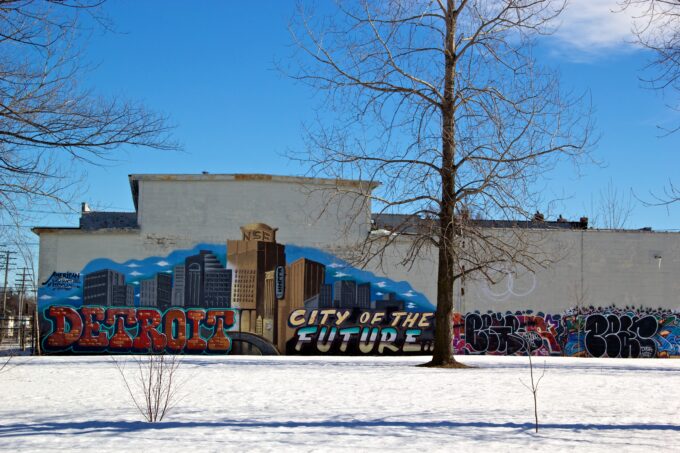New report outlines barriers to financial success for Detroiters

Jan. 22 virtual convening co-hosted by United Way for Southeastern Michigan and University of Michigan Poverty Solutions to discuss findings and solutions for families
Contact: Jerome Espy of United Way for Southeastern Michigan, jerome.espy@liveunitedsem.org, (248) 417-9567 (mobile)
DETROIT — For many low- and moderate-income Detroiters, the necessary ingredients for financial health and financial stability are out of reach. United Way for Southeastern Michigan is proud to partner with Poverty Solutions at the University of Michigan to release a study on the financial well–being of Detroit households. The study and workable solutions will be discussed during a virtual convening on Friday, Jan. 22, at 1:30 p.m. that is open to the public.
This first of several online convenings will discuss historic and systemic barriers Detroit families face to achieving financial well–being, a critical ingredient to creating and maintaining stable households.
The study, The Financial Well-Being of Detroit Residents: What Do We Know?, builds on United Way’s ALICE report. United Way’s ALICE report shows that 43% of families statewide and more than 74% of Detroit families struggle to meet their basic needs. The new report, written by researchers at University of Michigan’s Poverty Solutions, delves in-depth to identify the underlying reasons it is so difficult for the average Detroiter to consistently make ends meet – more so than in suburban towns and peer cities.
“It’s safe to say that these are turbulent times for all of us, but some are more impacted than others. The ongoing pandemic has shone a light on an issue that has existed for far too long – the financial and opportunity gaps that exist for the most vulnerable, particularly in Black and Brown populations,” said Dr. Darienne Hudson, president and CEO, United Way for Southeastern Michigan. “Thanks to this new research by the University of Michigan, we now can better understand the barriers those in our most challenged communities face every day and begin working toward lasting solutions.”
The report synthesizes a rich array of previously-published research from a range of sources together with original research from University of Michigan. Key findings from the report include:
- One-half of Detroit residents are either financially insecure (32%) or in financial trouble (24%).
- Tens of thousands of Detroiters struggle to earn sufficient and steady income; they also confront a set of disproportionately high basic expenses, including property taxes, auto insurance, and utilities.
- The combination of low and volatile incomes and disproportionately excessive costs makes it especially difficult for Detroit households to consistently maintain positive cash flow. In turn, this makes it challenging to build savings, protect assets, or maintain access to a bank account.
- Nearly one-third of residents with incomes below $30,000 said they are saving less following the COVID-19 outbreak, but it is encouraging that 40% of residents earning below $30,000 said they are saving more due to the pandemic.
- Detroit residents filed at least 43,020 consumer bankruptcy cases in court between 2008 and 2015.
- 66% of Detroiters have some form of debt in collections, including credit card debt, medical debt, and government fines and fees, according to a 2016 Urban Institute report.
- Limited disposable income makes it difficult for many Detroit households to build savings for short-term needs, long-term goals, or for an emergency like COVID-19.

Afton Branche-Wilson
“Our report illustrates the set of structural challenges Detroiters confront every day when seeking steady financial footing, such as high utility bills and unpredictable wages,” said Afton Branche-Wilson of Poverty Solutions at the University of Michigan and the report’s lead author. “We also highlight practical and urgent steps that policymakers and practitioners can take to help residents gain control over their finances, recover from financial setbacks, and build lasting financial security.”
The virtual convening on Friday, Jan. 22, at 1:30 p.m. will present key findings from the report and kick off a series of community conversations around opportunities for action to address the underlying conditions which create financial instability and hardship for so many Detroiters.
To register for the convening, visit: https://unitedwaysem.org/event/fwb-detroit/
For more information about United Way for Southeastern Michigan and their commitment to serving the community or to make a donation, please visit: UnitedWaySEM.org.
For more information about United Way’s ALICE report, please visit: https://www.uwmich.org/alice
For more information about University of Michigan’s Poverty Solutions, please visit: https://poverty.umich.edu/
ABOUT UNITED WAY FOR SOUTHEASTERN MICHIGAN
United Way for Southeastern Michigan, a member of the United Way Worldwide network and an independently governed 501(c)(3) nonprofit organization, works to help households become stable and ensure children have the support they need to thrive. For more than 100 years, United Way has been a leader in creating positive, measurable, and sustainable change in communities throughout southeast Michigan. United Way works in partnership with donors, agencies, corporate and municipal partners to help families meet their basic needs of housing, food, health care and family finances, and ensure children start school ready to learn and graduate ready for life. To give, advocate, volunteer or learn more, visit UnitedWaySEM.org.
ABOUT UNIVERSITY OF MICHIGAN’S POVERTY SOLUTIONS
Poverty Solutions is a university-wide initiative that aims to prevent and alleviate poverty through action-based research that informs policymakers, community organizations, government entities, and practitioners about what works in confronting poverty.
Release courtesy of United Way for Southeastern Michigan.
